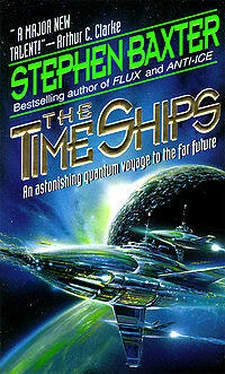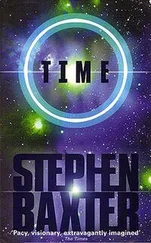We bathed our feet in the Sea. I rested my aching knees and calves, and relished the warmth of the sunlight on my face. Ironically it remained a beautiful day, with the sky clear and the Sea bathed in light. I observed how the action of the tide had already repaired much of the damage to the beach wrought by the best efforts of we humans the day before: bivalves burrowed again in the sooty sand, and I saw a turtle scampering through the shallows, almost close enough for us to touch.
I felt very old, and immeasurably tired: quite out of place, here at the dawn of the world.
We struck away from the beach and into the forest. I entered the gloom of that battered wood with dread. Our plan was to work through the forest around the camp site, following a circle a safe mile in radius. School-boy geometry was sufficient to provide an estimate of the six-mile hike we would have to complete around the circumference of that circle before we reached the sanctuary of the beach again; but I knew that we would find it difficult, or impossible, to stick to a precise arc, and I expected our full traverse to be considerably longer, and to take some hours.
We were already close enough to the epicenter of the blast that many of the trees had been toppled and smashed up — trees destroyed in a moment, which might otherwise have stood for a century — and we were forced to clamber over the charred, battered remnants of trunks, and through the forest canopy’s scorched remains. And, even where the effects of the first blast were less marked, we saw the scars of the storm of fire, which had turned whole stands of dipterocarps into clusters of charred, denuded trunks, like immense match-stalks. The canopy was quite disrupted; and the daylight piercing through to the forest floor was much more powerful than I had become accustomed to. But still the forest was a place of shadows and gloom; and the purple glow of that deadly, continuing explosion cast a sickly glow over the scorched remains of trees and fauna.
Not surprisingly, the surviving animals and birds — even the insects — had fled the wounded forest, and we proceeded in an eerie stillness broken only by the rustle of our own footsteps, and by the steady, hot breath of the Bomb’s fire-pit.
In some places the fallen wood was still hot enough to steam, or even to glow dull red, and my bare feet were soon blistered and burned. I tied grass around my soles to protect them, and I was reminded of how I had done the same as I made my way out of the forest I had burned in the Year 802,701. Several times we came across the corpse of some poor animal, caught in a disaster beyond its comprehension; despite the blaze, the putrefactive processes of the forest worked vigorously, and we were forced to endure a stink of decay and death as we walked. Once I stepped on the liquefying remains of some little creature — it had been a planetetherium, I think — and poor Stubbins was forced to wait for me as, with noises of disgust, I scraped the remains of the little animal from the sole of my foot.
After perhaps an hour, we came across a still, hunched form on the floor of the forest. The stench was so bad that I was forced to hold the remains of my handkerchief over my face. The body was so badly burned and misshapen that at first I thought it might be the corpse of some beast — a young diatryma perhaps — but then I heard Stubbins exclaim. I stepped to his side; and there I saw, at the end of a blackened limb stretched out along the ground, the hand of a woman. The hand, by some bizarre accident, was quite undamaged by the fire; the fingers were curled, as if in sleep, and a small gold ring sparkled on the fourth finger.
Poor Stubbins stumbled away into the trees, and I heard him retching. I felt foolish, helpless and desolate, standing there in the ruined forest with those shells of water dangling useless from my neck.
“What if it’s all like this, sir?” Stubbins asked. “You know — this.” He could not bear to look at the corpse, or in any way point to it. “What if we find no one alive — what if they’re all gone, all burnt to a crisp like this?”
I laid a hand on his shoulder, and sought a strength I did not feel. “If that’s so, then we’ll go back to the beach, and find a way to live,” I said. “We’ll make the best of it; that’s what we’ll do, Stubbins. But you mustn’t give up, man — we’ve barely started our searching.”
His eyes were white, in a face as soot-dark as a chimneysweep’s. “No,” he said. “You’re right. We mustn’t give up. We’ll make the best of it; what else can we do? But—”
“Yes?”
“Oh — nothing,” he said; and he began to straighten his kit, in readiness to go on.
He did not have to finish his sentiment for me to understand what he meant! If all the Expedition were finished save the two of us and the Morlock, then, Stubbins knew, the three of us would sit in our huts on the beach, until we died. And then the tide would cover our bones, and that would be that; we should be lucky to leave behind a fossil, to be found by some curious householder digging a garden in Hampstead or Kew, fifty million years from now.
It was a grim, futile prospect; and what — Stubbins would want to know — what was the best that could be made out of all that?
In grim silence, we left the girl’s charred corpse, and pressed on.
We had no way of judging time in the forest, and the day was long in that grisly wreckage; for even the sun seemed to have suspended his daily traverse around the sky, and the shadows of the broken stumps of trees seemed neither to shorten nor to track across the ground. But in reality it was perhaps only an hour later that we heard a crackling, crashing noise, approaching us from the interior of the wood.
At first we could not see the source of the noise — Stubbins’s eyes, wide with fear, were white as ivory in the gloom — and we waited, holding our breath.
A form approached us, coalescing from the charred shadows, stumbling and colliding with the tree stumps; it was a slight figure, clearly in distress but, nonetheless, undoubtedly human.
With my heart in my mouth, I rushed forward, careless now of the crusty, blackened undergrowth under my feet. Stubbins was at my side.
It was a woman, but with her face and upper body burned and so blackened I could not recognize her. She fell into our arms with a gurgled sigh, as if with relief.
Stubbins sat the woman on the ground with her back to a snapped-off tree stump. He muttered clumsy endearments as he worked: “Don’t you worry — you’ll be fine, I’ll look after you—” and so forth, in a voice that was choked. She still wore the charred remnants of a twill shirt and khaki trousers, but the whole was blackened and torn; and her arms were badly scorched, particularly on the underside of the forearms. Her face was burned — she must have been facing the blast — but there were, I saw now, strips of healthy flesh across her mouth and eyes, which remained comparatively unharmed. I surmised that she had thrown her arms across her face when the blast had come, damaging her forearms, but protecting at least some of her face.
She opened her eyes now: they were a piercing blue. Her mouth opened, and an insect-whisper emerged; I bent close to hear, suppressing my revulsion and horror at the blackened ruin of her nose and ears.
“Water. In the name of God — water…”
It was Hilary Bond.
Stubbins and I stayed with Hilary for some hours, feeding her sips of water from our shells. Periodically Stubbins set off on little circular tours of the forest, calling boldly to attract the attention of more survivors. We tried to ease Hilary’s wounds with Stubbins’s medical kit; but the contents of the kit — intended to treat bruises and cuts and the like — were quite inadequate to cope with burns of the extent and severity of Hilary’s.
Читать дальше
Конец ознакомительного отрывка
Купить книгу









